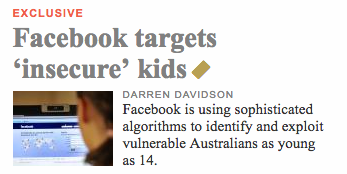Facebook rejects claims it targets ‘insecure’ teens
Facebook has rejected reports it targets vulnerable people with ads based on their emotional state after The Australian revealed a research paper purporting to set out the practice.
While Facebook has admitted the existence of the document, it said the research had been developed to understand how people express themselves on the social media platform – rather than as a means to target people when they are in a vulnerable state. The social media giant also conceded the research did not follow its normal procedures.
“On May 1, 2017, The Australian posted a story regarding research done by Facebook and subsequently shared with an advertiser,” a Facebook spokesperson said.
“The premise of the article is misleading. Facebook does not offer tools to target people based on their emotional state.
“The analysis done by an Australian researcher was intended to help marketers understand how people express themselves on Facebook. It was never used to target ads and was based on data that was anonymous and aggregated.”
The spokesperson said an internal review was now underway to identify how the research was produced outside of Facebook’s normal procedures.
“Facebook has an established process to review the research we perform,” the spokesperson said.
“This research did not follow that process, and we are reviewing the details to correct the oversight.”
It is understood the original premise of the research was to understand how people express themselves in social media channels.
Following reports about the research the Office of the Children’s eSafety Commissioner confirmed it had been in contact with Facebook for more information.
“The Office of the Children’s eSafety Commissioner has spoken with Facebook about its use of young users’ data to identify when they are emotionally vulnerable and targeting advertising at these users,” the commission said in a statement.
“The Office understands that the data used by Facebook to conduct the research in question was anonymous and aggregated. Facebook have also advised that the research did not follow their established process; they have accepted responsibility for this oversight and are conducting a review.
“Parents concerned about how data is collected and used by social media services should check the terms of service and enable privacy settings which give users control over how their data is used for advertising.”





Facebook was never going to commercialise that analysis, right? Or develop emotional targeting products/options? Which is why it was presented to one of the big four banks with a strict non-disclosure agreement, right? Just your average kind of “research” project….There’s more to it. Harder questions from Mumbrella required rather than selective, soft reporting.
User ID not verified.
Don’t hold your breath. Probably too scared to lose their keynote speaker..
https://mumbrella.com.au/facebook-global-cmo-gary-briggs-speak-mumbrella360-439334
User ID not verified.
Yeah… no
Tim – Mumbrella